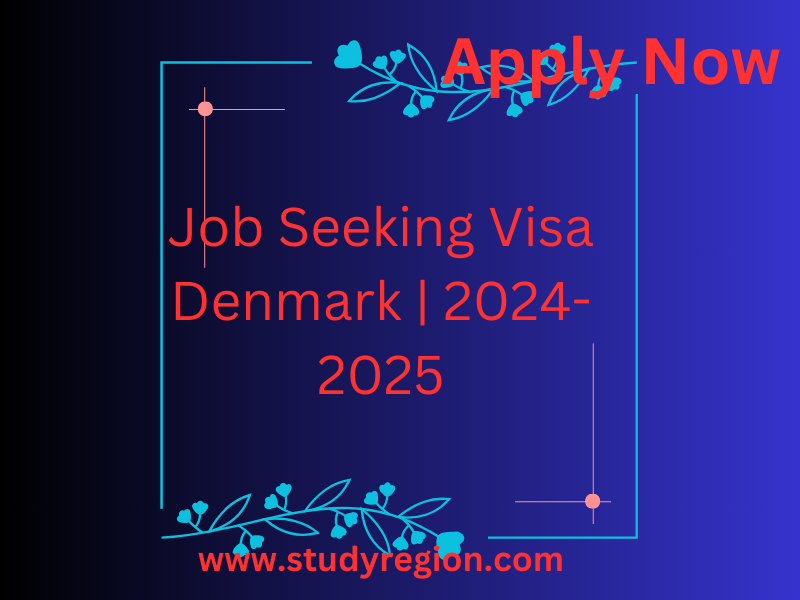Denmark has emerged as an attractive destination for skilled workers, especially in the wake of recent changes to its immigration policies.
The Danish government has relaxed work visa regulations to address a manpower crisis and attract foreign talent.
This job-seeking visa in Denmark, detailing eligibility, application processes, and the broader implications of these changes.
The Danish Job-Seeking Visa: An Overview
The job-seeking permit is a residence permit that allows individuals to search for employment in Denmark for a period of up to six months. This visa is particularly beneficial for those who have previously held a residence permit under various schemes such as the Authorisation Scheme or for students who have completed higher education in Denmark.
Eligibility Criteria
To qualify for a job-seeking visa, applicants must meet specific conditions:
- Previous Residence Permit: Applicants must hold a valid residence permit under the Authorisation Scheme, as a PhD student, or as a student in a higher educational program.
- Job Loss: Individuals who lose their job through no fault of their own (e.g., layoffs) may apply for this permit.
- Application Timing: The application must be submitted before the expiration of the original residence permit.
Application Process
- Gather Required Documents: Applicants need to prepare several documents, including:
- A valid passport
- Proof of previous residence permit
- Documentation showing the reason for job loss (if applicable)
- Evidence of previous employment
- Submit Application: Applications can be submitted online via the Danish Agency for International Recruitment and Integration (SIRI) website.
- Await Decision: After submission, applicants will receive notification regarding their application status.
- Job Offer: If an applicant secures a job during the six-month period, they must apply for a new residence and work permit before starting employment.
Limitations of the Job-Seeking Visa
While on this permit, individuals are not allowed to work unless they have applied for a new work permit based on a job offer. However, those who have completed higher education in Denmark may be eligible for additional work rights during their job search.
Why Denmark?
Denmark is known for its high quality of life, strong work-life balance, and robust economy. The country offers numerous advantages that make it an appealing destination for skilled migrants:
- High Standard of Living: Denmark consistently ranks high in global quality-of-life indices.
- Work-Life Balance: The Danish work culture emphasizes balance, with standard working hours typically capped at 37.5 hours per week.
- Social Security Benefits: Employees enjoy comprehensive social security benefits, including paid sick leave and parental leave.
Changes to Work Visa Regulations
In 2024, Denmark introduced significant changes to its work visa regulations to attract more skilled workers:
- Salary Threshold Reduction: The minimum salary requirement was reduced from DKK 465,000 to DKK 375,000.
- Fast-Track Procedures: The government has streamlined processes for recruiting foreign workers.
- Entrepreneur Visa: A new fast-track Entrepreneur Visa has been introduced to encourage business investments in Denmark.
These changes are aimed at addressing labor shortages in key sectors such as ICT, healthcare, construction, and finance.
Types of Work Permits in Denmark
Denmark offers several types of work permits depending on the applicant’s qualifications and job offers:
- Positive List Scheme: For professions experiencing shortages in Denmark.
- Pay Limit Scheme: For individuals earning above a certain salary threshold.
- Fast Track Scheme: For employees recruited by companies certified by SIRI.
Required Documentation for Work Visa Applications
To apply for any type of work visa in Denmark, applicants typically need to provide:
- A valid passport with at least two blank pages.
- Health insurance covering their stay.
- Employment contract or job offer letter.
- Academic qualifications relevant to the job.
Economic Impact of Immigration Policies
The relaxation of immigration policies is expected to positively impact Denmark’s economy:
- Labor Shortages Addressed: By attracting skilled migrants, Denmark can fill vacancies in critical sectors.
- GDP Growth: Increased employment among migrants contributes to economic growth; studies indicate that migrant workers contribute significantly to GDP.
Conclusion
The job-seeking visa in Denmark represents an excellent opportunity for skilled workers looking to relocate. With favorable immigration policies and an attractive living environment, Denmark is positioning itself as a prime destination for international talent. Understanding the application process and eligibility criteria is crucial for prospective applicants aiming to secure employment in this vibrant country. In summary, whether you are seeking temporary residence while searching for a job or looking to establish a long-term career in Denmark, navigating the visa landscape effectively will enhance your chances of success. As policies continue to evolve, staying informed will be key to making your Danish dream a reality.
